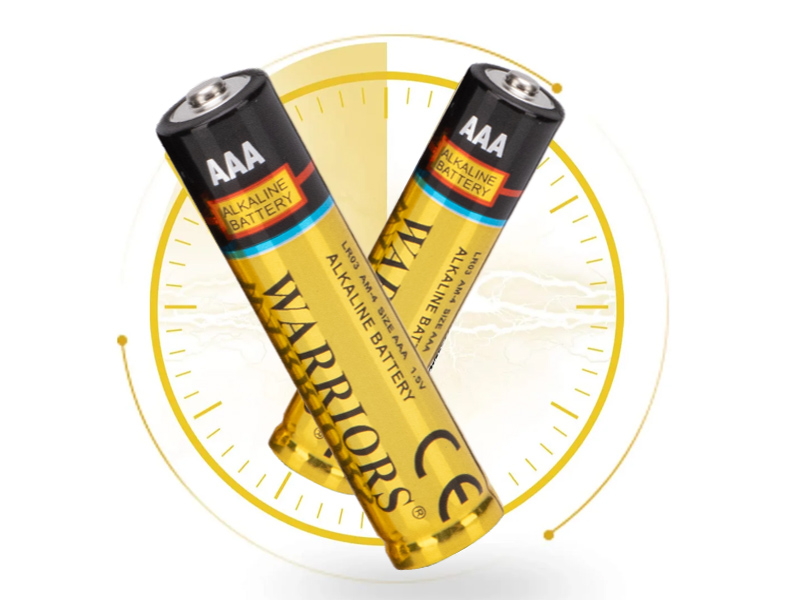English
English
Batteries provide the necessary power for a wide range of devices, including smartphones, laptops, electric vehicles and industrial equipment, making them an important and profitable commodity for many businesses. It is important for manufacturers, distributors and consumers to understand the shelf life of batteries and the logistics of storage and transportation.
Key points:
• Batteries will naturally deteriorate over time and due to changes in temperature, humidity, battery chemistry, etc., so it is very important to choose a warehouse supplier.
• Lithium-ion batteries typically have a lifespan of 2 to 3 years, while non-rechargeable lithium batteries can last up to 15 years under ideal conditions if stored properly.
• Batteries are classified as primary (non-rechargeable) and secondary (rechargeable), each with their own unique storage and handling needs.
• Maintaining proper storage conditions in warehouses, such as climate control, fire safety measures, short circuit protection, and regular inspections, is critical to maintaining battery quality and avoiding potential hazards.
What is the shelf life of a battery? When do batteries expire?

The shelf life of a battery is how long you can store it before it starts to lose performance. Even when not in use, batteries gradually lose performance through self-discharge and chemical reactions. Generally, a battery is considered expired when its discharge rate becomes too high or it is no longer able to provide enough power to a device.
Although batteries do not have a strict shelf life like food, they do have a "shelf life" that is related to their chemical makeup and storage conditions. In general:
• Alkaline Batteries: Under optimal conditions, storage life is 5-10 years.
• Lithium Batteries (Non-Rechargeable): If stored properly, lithium batteries typically last 10-15 years and have a very low self-discharge rate.
• Rechargeable Li-ion Batteries: Li-ion batteries degrade quickly and have an expected shelf life of 2-3 years regardless of use.
• Nickel Metal Hydride (NiMH) Batteries: If stored properly, NiMH batteries typically last 3-5 years, but they self-discharge more quickly than alkaline or lithium batteries.
• Carbon Zinc Batteries: These batteries have a shorter shelf life, typically only 1-3 years. They age faster than alkaline batteries and are more susceptible to leakage, especially in humid environments.
• Nickel Cadmium (NiCd) Batteries: NiCd batteries were once widely used in rechargeable applications and have a shelf life of about 1-3 years. If they are frequently charged and not fully discharged, they are susceptible to a "memory effect" that causes their capacity to decrease over time. These batteries also have a lower self-discharge rate, so they are best stored at room temperature and partially charged.
• Lead-acid batteries: With proper care, they can last 5-10 years. However, they need to be charged regularly to prevent sulfation, which damages the plates inside the battery and reduces its capacity. Cool storage is recommended, but not freezing, as cold temperatures help slow self-discharge.
The storage environment of the battery, such as temperature, humidity, and its chemical composition, can significantly affect its shelf life. For example, batteries stored in a high temperature environment will accelerate performance recovery and may even fail prematurely.
Disposable vs. Rechargeable Batteries
The main batteries can be divided into two types: disposable batteries and rechargeable batteries. They have different application scenarios, storage requirements and handling methods.
Disposable batteries
Also known as dry batteries, they cannot be recharged once the power is exhausted and must be properly handled, such as recycled. Common examples include alkaline batteries, carbon batteries, button batteries.
They are often used in low-power devices such as remote controls, flashlights and toys, blood oximeters, and thermometers.
Storage and handling requirements:
• Temperature: Store in a cool, dry place. Room temperature of 68-77°F is generally ideal for extended shelf life.
• Humidity: Low humidity prevents corrosion and leakage.
• Handling: Store in original packaging to prevent accidental discharge or damage to battery terminals.
• Separation: Store disposable batteries separate from rechargeable batteries to avoid confusion and possible safety hazards.
Rechargeable batteries

Can be recharged and used multiple times. Li-ion 18650 Rechargeable Batteries and AA NiMH Rechargeable Batteries are common examples, and are used in power-hungry devices such as smartphones, laptops, power tools, and electric cars.
Storage and handling requirements:
• Temperature: Store in a stable, cool environment to prevent chemical degradation. For lithium-ion batteries, avoid temperatures above 86°F (about 39°C).
• Charge Level: Ideally, rechargeable batteries should be charged 40-60% to extend life and reduce performance degradation.
• Fire Safety: Due to their energy density, secondary batteries, especially lithium-ion batteries, should be stored in fireproof containers or rooms.
• Insulation: Store batteries away from metal objects to avoid short circuits. Batteries should also be placed in non-conductive containers.
Why Battery Storage Is So Important
Proper battery storage is not only essential for longevity, but also for safety.
If batteries are not stored properly, they may cause serious consequences such as discharge, corrosion, and even explosion. High energy density batteries such as lithium-ion batteries need to be handled with care. For companies that manage a large number of batteries, strict storage procedures must be followed to reduce the risk of accidents and meet various safety standards.
Therefore, companies should give priority to cooperating with third-party logistics service providers with experience in battery logistics handling. Professional third-party logistics providers have a complete infrastructure, such as climate control, fire extinguishing systems, and comprehensive safety protocols to protect the safety of stored batteries and personnel.
Insulation and Short Circuit Protection
To avoid accidental short circuits, batteries must be insulated from each other and from metal objects. Using non-conductive containers, padded shelves, or specialized battery holders can help prevent battery terminal contact.
• Isolation pads: Placing insulating pads between battery layers or containers can help prevent accidental contact.
• Original packaging: Keeping batteries in their original packaging can further reduce the risk of short circuits, especially for batteries stored in bulk.
Our hours
Mon 11/21 - Wed 11/23: 9 AM - 8 PM
Thu 11/24: closed - Happy Thanksgiving!
Fri 11/25: 8 AM - 10 PM
Sat 11/26 - Sun 11/27: 10 AM - 9 PM
(all hours are Eastern Time)
Hi! Click one of our members below to chat on